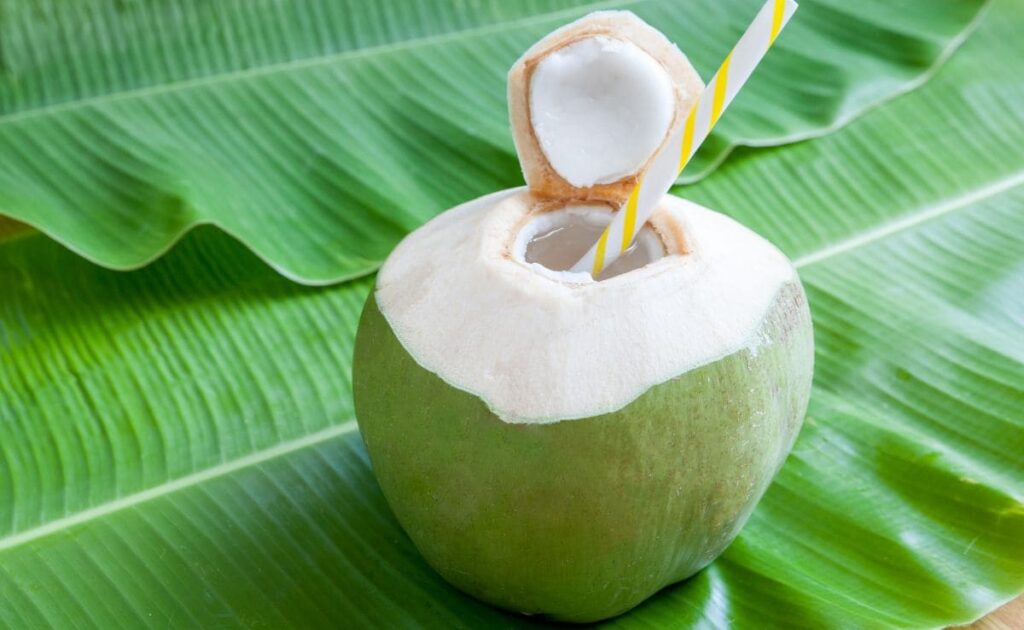In recent years, coconut water has become quite the trendy drink. Naturally sweet and hydrating, the popular beverage is loaded with several important nutrients, including minerals that many people don’t get enough of. The health benefits of coconut water abound. But how often should you be making the switch from your trusty tap water?

Coconut water benefits
Coconut water is most well-known for its ability to match your favorite sports drink’s electrolytes (which we’ll go over later), but that’s not its only asset:
It’s ultra-hydrating
Like regular water, coconut water’s main benefit is hydration, says Keri Gans, M.S., R.D., registered dietitian and author of The Small Change Diet. “Hydration helps keep our joints lubricated, delivers nutrients to our cells, and regulates our body temperature.” Due to sweating and electrolyte loss during exercise, coconut water may be beneficial for rehydration after exercise; however, its sodium content is lower than that of a sports drink, so it may not be as efficient, she points out.
Drinking enough water on a daily basis is one of the best things you can do for your health. In fact, the Academy of Nutrition and Dietetics recommends that women and men drink about nine and 13 cups per day, respectively, says Megan Meyer, Ph.D., a nutrition immunology and science communication expert. “Coconut water can help people meet their hydration needs, since it is about 95% water,” she adds.
It’s plentiful in key nutrients
“Depending on the brand, 8 oz of store-bought coconut water has around 500 milligrams (mg) of potassium, 30 to 40 mg of sodium, and 4% of the recommended daily value for magnesium and calcium,” explains Joanna Gregg, R.D., a MyFitnessPal registered dietitian. “If your diet is lacking in any of these nutrients, coconut water may be beneficial for reaching your daily needs.”
It’s a natural source of electrolytes
Electrolytes are minerals not found in water that help maintain various important bodily functions including hydration, muscle function, and a balanced blood pH, per the National Library of Medicine. When you sweat, you lose electrolytes, and while sports drinks may help replenish them after a good workout, they often come with unnecessary added sugars. Pure coconut water, on the other hand, does not—and one cup contains more than double the amount of electrolytes than the same yield of a traditional sports drink.
It’s high in potassium
Meyer puts special emphasis on coconut water’s potassium content, an electrolyte that supports muscle function, among other processes. “The U.S. Dietary Guidelines for Americans have identified potassium as one of the four nutrients of concern for Americans,” she explains. “Insufficient potassium intake can elevate blood pressure, deplete calcium in bones, and increase the risk of kidney stones.” As previously mentioned, a cup of coconut water delivers 500 mg of the nutrient.
It may support heart health
On the topic of potassium, getting an extra boost of it via coconut water may benefit your heart health. That’s because potassium may “help relax blood vessels in order to promote healthy blood flow and regulate blood pressure levels,” says Sarah Olszewski, M.S., R.D.N., C.D.N., a registered dietitian and Cure nutrition advisor. This is especially the case if you overdo it on sodium, which tends to raise blood pressure—having a dose of potassium can counteract those effects, according to the American Heart Association (AHA).
It’s low in calories
It’s natural to wonder if coconut water is a good drink for weight loss—and because it’s a tasty bev that’s lower in calories than alternatives like juice and soda, experts give it a thumbs up. However, it will never be as good for losing weight as good old, calorie-free water.
“Substituting high-calorie beverages with coconut water can be a healthier choice for individuals looking to manage their weight,” says Olszewski. “However, some packaged coconut water products may contain added sugars and higher calorie content, which may not be conducive to weight loss. It’s crucial to read labels and opt for pure, unsweetened coconut water when possible.”
It can be a powerful antioxidant
“Coconut water contains antioxidants that may help neutralize harmful free radicals in the body and protect cells from oxidative stress,” explains Olszewski. Animal-based studies have explored this theory with positive results, but more research is warranted in humans to determine how powerful its preventive effects really are.